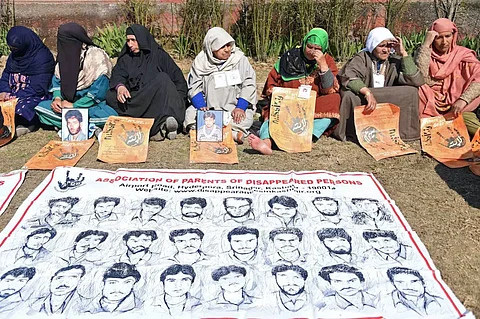

On Friday, the global community celebrates International Women’s Day to honour the achievements of women and advocate for gender equality. This year, the United Nations has chosen the theme “Investing in Women: Accelerating Progress” to emphasise the importance of women’s empowerment globally. In Jammu and Kashmir, however, the celebrations of International Women’s Day are overshadowed by the harsh reality. It is more of a sombre reminder of the ongoing struggles of women than a cause for celebration.
The loss of loved ones, including husbands, brothers and sons, has created a special category of women known as ‘half-widows’ who are trapped in uncertainty about the fate of their missing husbands. The region is full of whispered stories about the social hurdles half-widows face after the disappearance of their partners.
Added to this is the psychological trauma of rape and sexual assault, where victims face both the initial abuse and subsequent condemnation by patriarchal norms. The multiple effects of sexual assault on women are evident in psychological, emotional, economic and educational terms.
The staggering numbers illustrate the magnitude of this silent tragedy. Between 2,000 and 2,500 half-widows live in Jammu and Kashmir, each carrying the burden of deep loss and unresolved grief. In addition, there are 6,000 orphans, the children of these half-widows, who face the challenges of growing up after a conflict that has left them deeply scarred. However, these figures are just the tip of the iceberg, as the actual number is likely much higher and is masked by the pervasive fear and uncertainty that surrounds the region.
The number of this unique and tragic category has risen to thousands in recent years. What characterises these women is the unbearable pain and agony they endure, a burden that surpasses even that of other women whose loved ones have been tragically killed by Indian Army bullets.
Thousands of women facing an identity crisis and struggling with the ambiguity of their marital status are in a silent crisis. This struggle not only reflects a cultural divide but also throws light on the overlooked needs and gender equality issues of women in the region.
Thousands of women, labelled “half-widows”,” find themselves in a confusing situation where their marital status remains uncertain. Some half-widows consider remarriage, but numerous factors contribute to a complex decision-making process. Many hesitate because they believe that they will eventually receive information about their husbands. Others are deterred by fears that a stepfather might not accept their children or do what is best for them. Even for those who do consider remarriage, social stigma and the interpretation of religious rules remain.
Plight of half-widows
The lack of a clear explanation about the fate of their missing husbands plunges them into a constant identity crisis. This dilemma is indicative of the cultural divide in Kashmir, where women’s rights and equality are often not recognised, leaving these women to languish in the shadows of uncertainty.
To legally declare a missing person dead requires the intervention of a cleric who is well-versed in Sharia law. Unfortunately, these clerics seem to be indifferent and do not want to recognise the agony of the half-widows. As a result, these women are denied the rights to which they are rightfully entitled. Their struggle does not fit into the categories established by various NGOs, orphanages or widows’ homes, which further aggravates their plight.
While men are the main victims of enforced disappearances worldwide, women are also affected in Kashmir. The term refers to cases where people go missing and the circumstances of their disappearance are shrouded in uncertainty and fear. A major challenge in tackling this problem is the lack of thorough investigations. From the beginning, there have been few proper investigations into these cases, making it difficult to grasp the full extent of the problem.
Fear of retaliation and reprisals prevents many affected families from reporting these cases, resulting in incomplete documentation of the problem. As a result, the actual number of people who have disappeared is unknown. However, it is estimated that more than 8,000 men disappeared during the turbulent period between the late 1980s and the early 2000s. The authorities have given widely varying figures for these disappearances, ranging from 1,105 to 3,931.
In August 2011, the State Human Rights Commission (SHRC) in Jammu and Kashmir uncovered the discovery of 2,730 unidentified bodies buried in 38 unmarked graves in three districts of north Kashmir, but a full investigation into these mass graves is still pending.
The process of reporting missing persons in Srinagar is a daunting ordeal with many obstacles that only add to the distress of the affected families. Attempting to report a missing member often leads to pressure and intimidation from the police, forcing some families to withdraw their report out of sheer fear.
Making the situation even more ironic for the women is the fact that the government relief pension, a nominal sum of 100,000 rupees (£937), is only granted if the families obtain a death certificate from the district authorities. There is, however, a cruel catch: the families must first prove that the missing victim was not involved in activities that could be construed as political militancy. This bureaucratic hurdle makes matters worse and further delays help for the families who desperately need it.
*The author is head of the research and human rights department of the Islamabad-based think tank Kashmir Institute of International Relations (KIIR). She can be contacted at: mehr_dua@yahoo.com
—–
Have you liked the news article?